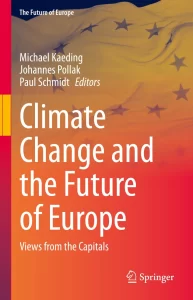Climate Change and the Future of Europe
Views from the Capitals
Editors: Michael Kaeding, Johannes Pollak, Paul Schmidt
© Springer Nature SwitzerlandAG 2023
Presents insights from over 50 experts in more than 40 countries in the EU and neighboring regions
Provides examples of national paths toward climate neutrality, and on public perception of the climate crisis
Includes recommendations on how policy-makers should implement climate policies, both at the national and EU level
Part of the The Future of Europe book series (TFOE)
Hard Pressed by External Actors: Sustainability Transition in Hungary
Dániel Muth & John Szabo
Pages 53-56
First Online:
Abstract
Climate change has recently become a salient social issue in Hungary, as numerous surveys and polls confirm that Hungarians are as concerned about the devastating effects of deteriorating environmental conditions as their European peers. The ruling Fidesz party, continuously in power since 2010, has also shifted rhetorically from a moderately climate-sceptic stance to a pro-environmental position, but it did so in a context where the country’s carbon-intensity per capita is relatively low. Despite the populaces’ similar levels of concern over climate change, there are immense differences between the action that EU15 countries (which include the 15 countries in the EU from 1 January 1995 to 1 May 2004) and Hungary plan to take. Hungarians may express strong ecological concerns, but their material considerations prevail, with the government frequently claiming that the country is already on a low carbon trajectory.
Citation:
Muth, D., Szabo, J. (2023). Hard Pressed by External Actors: Sustainability Transition in Hungary. In: Kaeding, M., Pollak, J., Schmidt, P. (eds) Climate Change and the Future of Europe. The Future of Europe. Springer, Cham. https://doi.org/10.1007/978-3-031-23328-9_13



